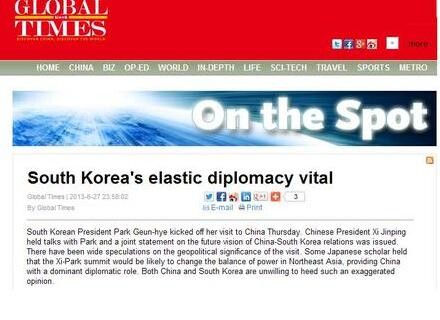hankyoreh
Links to other country sites 다른 나라 사이트 링크
The US, Chinese and Japanese media reactions to Pres. Park’s China summit

By Seong Yeon-cheol, Park Hyun and Jeong Nam-ku, Beijing, Washington and Tokyo correspondents
China, US, and Japan had very different takes from Seoul - and each other - on the recent summit between South Korean President Park Geun-hye and Chinese President Xi Jinping.
The Chinese press emphasized the diplomatic strategy benefits of bringing South Korea over to Beijing’s side.
The overseas edition of the People’s Daily, the newspaper of the Chinese Communist Party, published a June 28 column by Renmin University School of International Studies professor Wang Yiwei, who wrote, “China and South Korea, respectively a typical emerging nation and a typical mid-level developed country, can themselves establish a special new-model bilateral relationship.” This, Wang claimed, would allow them to transcend the abnormal situation of the US’s “return to Asia.”
The Global Times, the newspaper’s sister newspaper with a focus on international issues, printed a June 29 editorial noting the “strategic difference between putting South Korea within the bosom of the US or between two powers,” referring to the US and China.
Other news outlets noted that Park broke with precedent by visiting Beijing before Tokyo. Phoenix Television noted the difference from her predecessor Lee Myung-bak, who “slighted Northeast Asia with his with pro-US actions.”
The Xinhua news agency highlighted the results of the talks in terms of the North Korean nuclear issue.
“The two leaders are now strengthening ties and applying concerted pressure toward North Korea’s denuclearization,” it noted.
Major US newspapers also commented on Park and Xi’s decision to cooperate on the nuclear issue, but differed in their emphasis.
The Wall Street Journal wrote that the leaders had “played up their countries’ ties and a need for dialogue to tackle North Korea’s nuclear threat but reiterated their divergent positions on how to initiate talks with Pyongyang.” In particular, it noted that Park had stressed the need for denuclearization steps from Pyongyang before a resumption of the six-party talks, while Xi had advocated resuming multilateral dialogue, including the talks, as quickly as possible.
The Washington Post said China was taking advantage of the summit with Park to indicate its own displeasure with Pyongyang for going ahead with long-range missile and nuclear device testing despite Beijing’s objections.
Some news outlets in Japan noted that Seoul and Beijing seemed to be putting up a united front against Tokyo.
The Yomiuri Shimbun newspaper said that Beijing “obviously saw this summit as the perfect opportunity to stage a ‘South Korean-Chinese honeymoon’ and keep Japan in check.”
“Some believe that Park actually visited China before a summit with Tokyo in order to communicate her own distrust of the [Shinzo] Abe administration,” it continued.
Another Japanese newspaper, the Asahi Shimbun, said the summit “showed signs of China attempting to ally itself with South Korea on historical issues in order to contain Japan.”
Please direct questions or comments to [english@hani.co.kr]

Editorial・opinion
![[Column] Season 2 of special prosecutor probe may be coming to Korea soon [Column] Season 2 of special prosecutor probe may be coming to Korea soon](https://flexible.img.hani.co.kr/flexible/normal/500/300/imgdb/original/2024/0426/3317141030699447.jpg) [Column] Season 2 of special prosecutor probe may be coming to Korea soon
[Column] Season 2 of special prosecutor probe may be coming to Korea soon![[Column] Park Geun-hye déjà vu in Yoon Suk-yeol [Column] Park Geun-hye déjà vu in Yoon Suk-yeol](https://flexible.img.hani.co.kr/flexible/normal/500/300/imgdb/original/2024/0424/651713945113788.jpg) [Column] Park Geun-hye déjà vu in Yoon Suk-yeol
[Column] Park Geun-hye déjà vu in Yoon Suk-yeol- [Editorial] New weight of N. Korea’s nuclear threats makes dialogue all the more urgent
- [Guest essay] The real reason Korea’s new right wants to dub Rhee a founding father
- [Column] ‘Choson’: Is it time we start referring to N. Korea in its own terms?
- [Editorial] Japan’s rewriting of history with Korea has gone too far
- [Column] The president’s questionable capacity for dialogue
- [Column] Are chaebol firms just pizza pies for families to divvy up as they please?
- [Column] Has Korea, too, crossed the Rubicon on China?
- [Correspondent’s column] In Japan’s alliance with US, echoes of its past alliances with UK
Most viewed articles
- 1[Column] Season 2 of special prosecutor probe may be coming to Korea soon
- 2No good, very bad game for Korea puts it out of Olympics for first time since 1988
- 3‘We must say no’: Seoul defense chief on Korean, USFK involvement in hypothetical Taiwan crisis
- 4Division commander ordered troops to enter raging flood waters before Marine died, survivor says
- 5Is Japan about to snatch control of Line messenger from Korea’s Naver?
- 6Korea’s 1.3% growth in Q1 signals ‘textbook’ return to growth, says government
- 7Is N. Korea threatening to test nukes in response to possible new US-led sanctions body?
- 8[Editorial] Korea’s surprise Q1 growth requires objective assessment, not blind fanfare
- 9[Editorial] New weight of N. Korea’s nuclear threats makes dialogue all the more urgent
- 10[Editorial] In the year since the Sewol, our national community has drowned